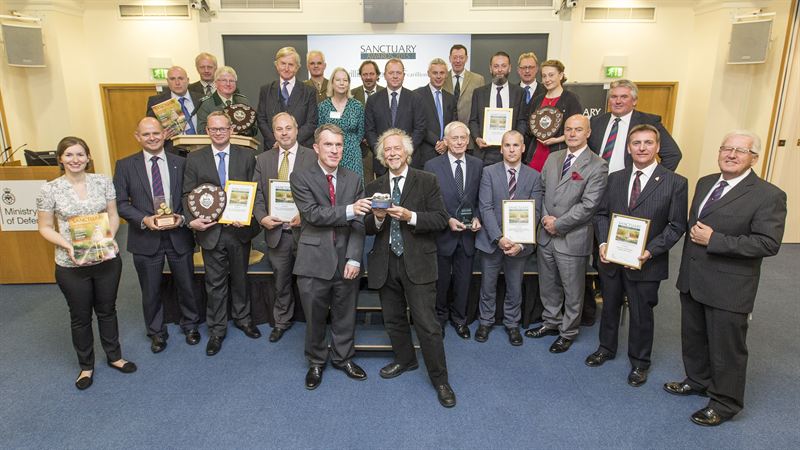Search for First World War horse hospital wins prestigious award

The Ministry of Defence (MOD) has presented their coveted ‘Silver Otter’ Sanctuary Award to a Salisbury Plain archaeological project.
The Sanctuary Awards are awarded annually by the Ministry of Defence and are run by the Defence Infrastructure Organisation, the MOD’s property and services arm. Nominations are in recognition of work which promotes sustainable development, energy saving measures, wildlife, archaeology, environmental improvement or community awareness of conservation on or within land and property owned or used by the MOD. Sanctuary Awards are presented to the winning project in various categories, including Heritage, Energy, Sustainability, Individual and Environmental. The winner of each category is then considered for the ‘Silver Otter’ grand prize, which this year was won by the ‘Digging War Horse’ project.
This examined the important role horses played during the First World War by excavating the suspected Larkhill site of a horse hospital from the period. Horses were used for cavalry, transporting supplies and pulling ambulances during the conflict. In 1917 Army records indicated nearly 870,000 horses and mules working for the British Army. The project was named after the children’s book – now a successful stage play and film – War Horse, by Michael Morpurgo, which follows the story of Joey, a horse dragged into the First World War, and his owner and friend Albert who follows him to the battlefields of France.
The dig team, assisted by a DIO professional archaeologist Richard Osgood and renowed archaeologist Julian Richards, found numerous horseshoes, remains of buildings, buttons and badges from both British and ANZAC soldiers, and ammunition. ‘Digging War Horse’ which tied in with the centenary of the start of the First World War, was part of Operation Nightingale, a project which encourages injured veterans and serving military personnel to take part in archaeological digs to help aid their recovery. Other participants included Army recruits and numerous schoolchildren, learning a huge amount about the First World War and archaeology. The dig itself was followed by holding public events to show interested people their findings, including opportunities to try trench food and see artillery pieces from the First World War. The project’s partner schools took the learning back to the classroom, working on poetry and designing trench scenes inspired by what they had learned in their time on the dig and reading War Horse.
Richard Osgood, DIO’s Senior Archaeologist, said:
“Digging War Horse was a fascinating project. Though we didn’t find everything we hoped for, it was really valuable for the soldiers and veterans to see the sort of environment their First World War counterparts operated in.
The judges were impressed by the number of local people, especially children, who were able to visit the dig and the public event and which is gratifying as that was a very important part of the project for those of us taking part.”
A project at Devonport naval base to construct a new waste facility to generate heat and energy from waste which would otherwise have gone to landfill scooped the Energy Award and the Environmental Project Award went to the Senne Environmental Working Group. This group aims to protect habitats and wildlife in the Senne Training Area in Germany. Mike Jelf, Chairman of the Imber Conservation Group, won the Individual Award for his tireless contribution to conservation on Salisbury Plain over a number of years. Aspire Defence Services Limited won the Sustainability Award and Sustainable Business Award for their sustainability focus in their role as total facilities management contractors on Project Allenby/Connaught, a project to build and renovate high quality living accommodation for nearly 19,000 soldiers on Salisbury Plain. Aspire worked hard to generate huge increases in the amount of waste recycled and used any non-recyclable waste to generate electricity, resulting in no waste from the site going to landfill.
Ends
Press enquiries to Helen Pickering, Assistant Communications Officer 0121 311 2413 or email helen.pickering101@mod.uk
DIO website: www.gov.uk/dio
Twitter: @mod_dio
Read DIO’s blog: https://insidedio.blog.gov.uk/
Notes to Editors
1) The Defence Infrastructure Organisation (DIO) plays a vital role in supporting our Armed Forces by building, maintaining and servicing what the men and women who serve our country need to live, work, train and deploy on operations.
2) DIO is part of the Ministry of Defence (MOD). It is responsible for managing and maintaining land and properties, as well as providing related support services, to meet the current and future needs of the MOD and personnel at home and abroad, and to support current operations.
3) Our work includes supporting operational units by providing and improving single living and service family accommodation; training areas and historic military sites. DIO actively manages these to ensure the needs of Defence are met, value for money is achieved, and its heritage is protected, and to achieve its environmental goals.
Tags:


